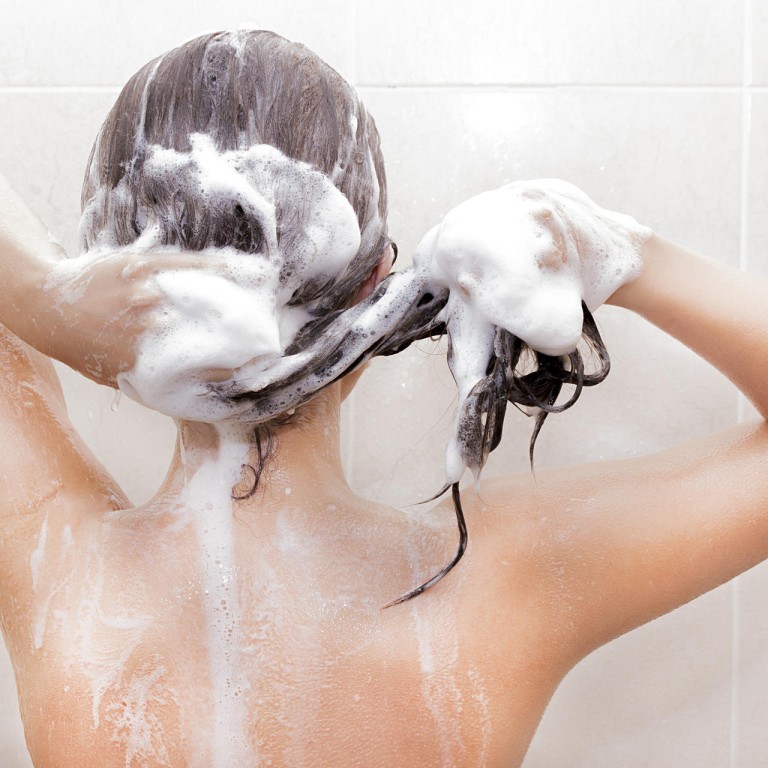
No poo movement advocates suds-free hair care
Despite its squeaky-clean marketing image, shampoo has a snake oil side. So say proponents of the "no poo movement".
Regular shampooing is counterproductive, they say, because, in reaction, your scalp just makes more of the natural oil called sebum - spurring a vicious cycle.
There had never been a time that he didn't have a cracked, peeling, itchy, dry scalp
The theory goes that you should skip applying industrial shampoo and instead enlist a milder substance.
Wellness coach Leanna Cappucci embraces that view. Until she adopted the no-poo method six months ago, her six-year-old son Dominic had eczema on his scalp. Within 30 days of kicking the chemical shampoo habit, his scalp was healthy for the first time.
The difference was "enormous", Cappucci says. "There had never been a time that he didn't have a cracked, peeling, itchy and dry scalp since the day he was born."
Now, she washes his hair with softer substances. Think diluted, plain baking soda, white or raw apple cider vinegar and essential oils like sweet orange or tea tree.
Commercial hair care products just inflame her son's scalp, she says. Cappucci regards such shampoos as unnecessary and costly.
After its detergents strip your scalp of natural oils and you apply conditioner to compensate, you just expose yourself to harmful chemicals, she says, singling out "red 40" - among several synthetic dyes said to be carcinogenic - which is banned in Europe for its link to behavioural problems.
For your first two shampoo-free weeks, she warns, you will hate the feel. It takes between 14 and 30 days for your hair to realise that things have changed and you will not be replacing your scalp's natural oils with fake ones.
Then, Cappucci says, your body starts producing and regulating its own natural oils. "Stick with it."
Stylist Andrea Jacobs also advocates the detergent-free hair care approach. Usually, warm or hot water from the shower is enough to rinse away natural body oils and most hair products, Jacobs says, adding that just massaging your scalp with your fingertips conditions the ends.
Once Jacobs' salon clients cut chemicals, they are surprised at how good their hair looks. Better yet, she says, their hair is easier to style because there is less dryness and fewer split ends. Another perk is less gunk going down the drain and potentially poisoning the water supply. Also, she says, you consume less plastic packaging. Fellow stylist LaVonne Booker has mixed feelings about the approach, which she has tested. When her hair was free from build-up - or residue from hair care products - it worked reasonably well, she says.
She suggests using apple cider vinegar or shampoo that is free from lather-producing sulphates linked with dryness - or worse conditions.
A 1983 report in the American College of Toxicology's journal showed that concentrations as low as 0.5 per cent of the common shampoo ingredient sodium lauryl sulphate could cause irritation. Concentrations of 10 to 30 per cent caused skin corrosion and severe irritation, the report said.
But like many hair care experts, Booker has qualms about spurning synthetic shampoo because, when she wears hairspray, no-poo cleansing attempts leave her hair feeling "nasty". Focus on keeping both your hair and scalp clean, she says, adding that she sees no harm in using shampoo.
Nor does dermatologist Dr Sami Abbasi. "Over-the-counter shampoos are usually harmless," Abbasi says, adding that unless a person is allergic to an ingredient, they should not cause significant problems.
Independent cosmetics chemist Ron Robinson also finds little fault with regular shampoo. You might want to pass if you have colour-treated or processed hair, or even dry, curly hair, which might mean that regular shampooing worsens the problem, he says.
Still, he confirms that shampoo is useful if you have dandruff or oily hair.
The faith many experts retain in normal shampoo suggests that the worries about it might be exaggerated. Still, the no poo movement has gained traction, boosted by research with a showbiz twist. star Robert Pattinson, singers Jessica Simpson and Adele, and Britain's Prince Harry reportedly don't habitually use shampoo.
After a 2007 interview by Sydney radio host Richard Glover with columnist Matthew Parris, who had skipped shampooing for more than a decade, Glover challenged his audience to renounce shampoo for six weeks.
Of the more than 500 participants in the challenge, 86 per cent said "their hair was either better or the same".
